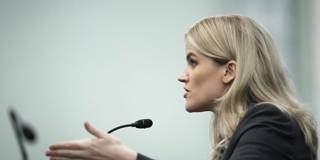Although whistleblowing isn’t a panacea for corruption and corporate malfeasance, it has proven highly effective as a last line of defense against behavior that is both economically harmful and politically destabilizing. As such, there is a strong case for establishing a new global agency to manage the process.
NEW YORK – In September 2021, the US Securities and Exchange Commission handed an anonymous whistleblower $110 million. It was the second-highest single award to an informant whose actions have led to a successful prosecution since the SEC launched its whistleblowing program in 2012.
In one of the program’s earliest cases, Sherry Hunt received a $31 million payout in 2012 as a settlement for revealing that her employer, Citigroup, was buying mortgages from outside lenders with doctored tax forms, phony appraisals, and missing signatures. Later that year, the Internal Revenue Service awarded an even higher payout – $104 million – to Bradley Burkenfeld for exposing many secrets of the Swiss banking system. All in all, since 2012, the SEC has awarded more than $1 billion to more than 200 informants. Each received a payment of between 10% and 30% of all fines collected in cases where penalties are more than $1 million.
The SEC’s program therefore has been instrumental to encourage whistleblowers to come forward and report illicit, illegal, and corrupt behavior in the private sector, and many see whistleblowers as a crucial line of defense against bad actors. In a recent high-profile whistleblower case, Frances Haugen, a former product manager at Facebook, filed a complaint with the SEC that, while not pointing to a clear-cut case of illegality, raises questions about the social obligations of Big Tech companies.

NEW YORK – In September 2021, the US Securities and Exchange Commission handed an anonymous whistleblower $110 million. It was the second-highest single award to an informant whose actions have led to a successful prosecution since the SEC launched its whistleblowing program in 2012.
In one of the program’s earliest cases, Sherry Hunt received a $31 million payout in 2012 as a settlement for revealing that her employer, Citigroup, was buying mortgages from outside lenders with doctored tax forms, phony appraisals, and missing signatures. Later that year, the Internal Revenue Service awarded an even higher payout – $104 million – to Bradley Burkenfeld for exposing many secrets of the Swiss banking system. All in all, since 2012, the SEC has awarded more than $1 billion to more than 200 informants. Each received a payment of between 10% and 30% of all fines collected in cases where penalties are more than $1 million.
The SEC’s program therefore has been instrumental to encourage whistleblowers to come forward and report illicit, illegal, and corrupt behavior in the private sector, and many see whistleblowers as a crucial line of defense against bad actors. In a recent high-profile whistleblower case, Frances Haugen, a former product manager at Facebook, filed a complaint with the SEC that, while not pointing to a clear-cut case of illegality, raises questions about the social obligations of Big Tech companies.